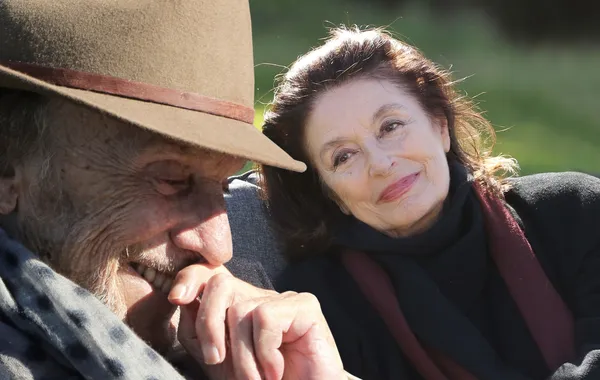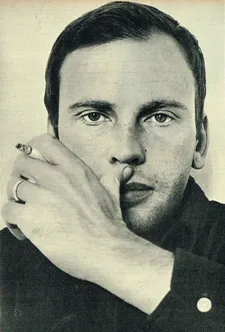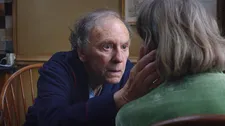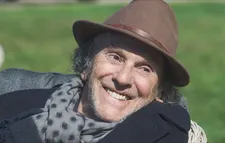 |
| Jean-Louis Trintignant and Anouk Aimée when they reteamed three years ago for The Best Years Of A Life Photo: UniFrance |
 |
| Jean-Louis Trintignant: 'Perhaps I should have made 11 films instead of 110' Photo: UniFrance |
He was a reluctant and sometimes reclusive focus of attention over more than four decades and came to the fore internationally in the Sixties and Seventies when he played the lovelorn racing driver opposite Anouk Aimée in Claude Lelouch’s A Man And A Woman; a mysterious prosector in Costa-Gavras’s Z, a twisted assassin in Bernardo Berloucci’s The Conformist and in the romantic drama (opposite Françoise Fabian) in My Night With Maude by Eric Rohmer.
When he was 82 he emerged from a self-declared “retirement” to rediscover career glory all over again as a carer for his wife in Michael Haneke’s Amour which won best foreign language film Oscar and a Palme d’Or at the Cannes Film Festival in 2012.
His career spanned both art house and commercial successes coming to sharp focus in 1956 opposite Brigitte Bardot in Roger Vadim’s And God Created Woman, causing a scandal in its day for its free-wheeling sexuality. Just after making it he was sent to Algeria as a conscript during the independence struggles.
Trintignant was the son of a well-off industrialist with an interest in fast cars as an amateur racing driver which meant he did all his own stunts in the red Ford Mustang careering on the Deauville beach in A Man and a Woman. The interest ran in the family: his uncle was two-time Monaco Grand Prix winner Maurice Trintignant.
He was born on 11 December, 1930 in the tiny village of Piolenc in southern France and grew up in the neighbouring community of Port Saint Esprit as well as Aix en Provence. He went against parental advice, dropped out law school and headed to Paris to begin acting on stage before being noticed by, among others, Costa-Gavras, who cast him as Simone Signoret’s young lover in the director’s debut film The Sleeping Car Murders.
Other notable appearances were for Krzysztof Kieslowsi in the last of his highly revered trilogy Three Colours: Red in 1994 as a reclusive ex-judge.
When he wasn’t working Trintignant loved to spent time at a medieval estate he had acquired at Usez in the south of France where he relished riding his motorbike in private. At one point he shared an historic home in the Marais in Paris with his then wife, filmmaker Nadine Trintignant, with whom he had a son Vincent, and the late director Alain Corneau. When I visited to talk to Corneau about a focus on his films as part of the French Film Festival UK I was told that M Trintingnant was upstairs but disappointingly he never appeared. He remarried, wedding the professional racing car driver Marianne Hoepfner in 2000, with whom he spent his latter years. She had revealed that the actor had been battling prostate cancer since 2018 and was in declining health
 |
| Jean-Louis Trintignant in Amour Photo: Unifrance/Films du losange/Denis Manin |
Despite ill health he was prised out of his “retirement” again when Claude Lelouch suggested reteaming with Anouk Aimée for a reprise of their relationship in A Man and A Woman in The Best Years Of A Life some 50 years on and which was premiered at the Cannes Film Festival in 2019.
Trintignant recalled in an interview conducted for the film: “The first time Claude told me about his idea, I asked him why he wanted to do it. I wondered who would be interested in it, but he insisted, and in the end he won me over. That’s Claude’s power: he leads people, both in his projects and his films. And that was it. We did it, and I don’t regret it, because I’ve rarely done anything so enjoyable.”
He also recalled how he landed the original role. “At the time more than 50 years ago I already had 40 films to my name, many of them Italian. But that film was the biggest surprise of my acting career. I had already seen a few of Claude’s films. They were already very good, but something was still missing. I was friends with Pierre Barouh, the songwriter, and he’s the one who put me in touch with Claude. I thought this Lelouch guy was pretty weird... While we would sleep in he would get up bright and early. He went jogging; he didn’t drink; he didn’t smoke. He was very different from us. He already displayed an unusual discipline.
“I was in Haneke’s last two films [Amour and Happy End]. Before doing this one, I asked Claude which filmmakers he likes, and he mentioned Haneke. That made me really happy, because it’s a style that’s very different from his, but which he still likes, because Claude is crazy about filmmaking, in all its styles, as long it’s sincere.”
Trintignant once told me revealingly: “All in all, I didn’t really want to be an actor. I think I would have been happier in a career outside of the spotlight — like a volcanologist, or a musician. I would have been happier. This line of work can be very satisfying, but it’s always a surprise. I’ve made more than 110 films. There are a few success stories in there, but they’re few and far between. I should have made 11 films instead of 110. Every time I’ve been offered a part, I responded sincerely that there were others who would probably be better than me. But producers would insist and say they needed me, and in the end I would do it.”
His last word on the subject? “You know, I talk a lot of nonsense sometimes: I really have been quite happy to be an actor.”






















